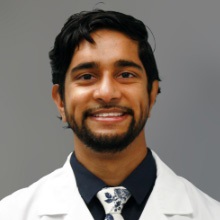
By Afif Hossain, MD
“Mr. W.” is a 72-year-old veteran with atrial fibrillation (AF) and a history of colon cancer status post hemicolectomy, heart failure with preserved ejection fraction, prior ischemic stroke, peripheral arterial disease, obstructive sleep apnea, type 2 diabetes mellitus, hypertension, hyperlipidemia, tobacco use, and class 2 obesity presenting to fellow’s clinic for follow-up. He had previously been followed by an outside cardiologist in rural west New Jersey but had transitioned care to the Veterans Administration (VA) hospital system over a year ago.
A husband and father to two children, he is optimistic despite overcoming many difficulties in his lifetime. He is accompanied by his wife, who insisted he come in after 14-day cardiac monitoring with a patch recorder showed significant burden of AF despite up-titration of medical therapy. With his previous cardiologist, he agreed to take aspirin 81 milligrams instead of full dose anticoagulation, as he was concerned about bleeding risk after his bout with colon cancer.
Using the ACC CardioSmart “AFib and High Risk for Stroke” shared decision-making tool, we were able to discuss the risks and benefits of anticoagulation for AF.
Given his elevated CHA2Ds2VASc score of 7, predicting an 11.2% annual risk of ischemic stroke (or 15.7% risk for stroke/transient ischemic attack/embolic event) without anticoagulation, we discussed the risks and benefits of different therapies to protect against embolic stroke. These options included no medications, continuing with aspirin and other medical therapy, trialing anticoagulation, and/or procedural options.
Adopting a “Patient-First” Attitude
After a detailed discussion, “Mr. W.” divulged that he felt as though he was losing control of his health. He admitted that his reluctance and rejection of optimal medical therapy was not to defy physicians – whom he respected – but a way for him to regain composure. He felt overwhelmed and overburdened. When I showed him and his wife the ACC decision-making tool for AF, they were taken aback by its simplicity and clarity. Concise language, pictorial representations of stroke risk, and details regarding bleeding risk stood out to them. Prior to our conversation, he was unaware of the different types of anticoagulation. With the aid of the handout, which lays these options side by side, he was able to garner a clearer understanding of his treatment options. When utilized properly, this tool has potential to increase patient understanding, reduce visit times, and increase medication adherence. After our visit, he felt better equipped to take back control of his health.
Communication is Key
I was able to share this video on AF and stroke risk with him and his wife. It helped them realize they were not alone and that in fact, millions of Americans suffer from AF. As a result, he went on to discuss his experience with AF with fellow veterans and was shocked to learn how many also had AF. As physicians, we must have conversations with our patients instead of speaking at them. With every patient, we must prioritize open communication, listening, and understanding. Only after allowing patients to express themselves can we truly meet their needs.
Ultimately, “Mr. W.” agreed to initiate anticoagulation with apixaban. He was intrigued by the idea of a left atrial appendage closure (LAAC) device, which was discussed in greater detail at subsequent visits in conjunction with my attending cardiologist and electrophysiologist. He and his wife left the visit with a copy of the handout and hopeful smiles on their faces.
Diversity, Equity and Inclusion
As a fellow in training (FIT) who also works with urban populations in Newark, East Orange, and Jersey City, I find having a resource with simple distillations of complex disease processes is invaluable. Many of my patients have low income, low health literacy and, often, multilingual immigrant backgrounds. Being just miles away from an international airport, having handouts in different languages like Spanish is also crucial. Similarly, graphic representations mitigate language barriers and facilitate shared decision-making.
I’ve learned that shared decision-making empowers patients to advocate for their health. After all, patients can only inquire about that which they are informed and knowledgeable about. Otherwise, we leave our patients alone, helpless and in the dark.
Afif Hossain, MD, is a cardiology fellow at Rutgers New Jersey Medical School.